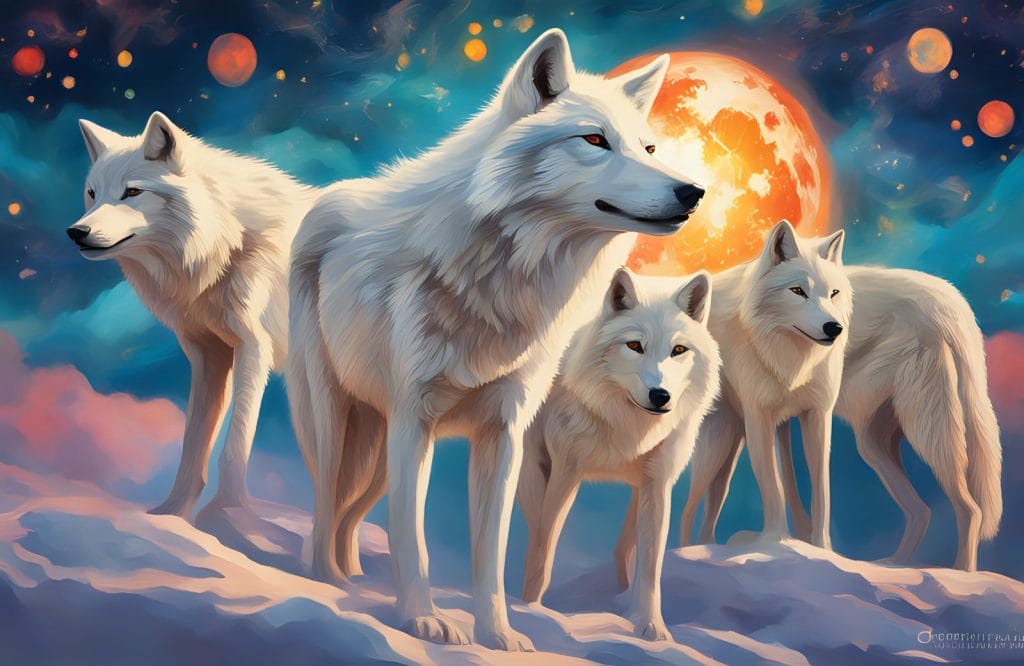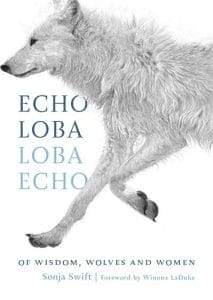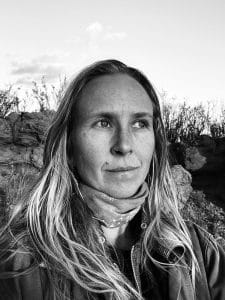Sonja Swift: Of Wisdom, Wolves & Women

Of Wisdom, Wolves & Women
Interview with poet & author of Echo Loba, Loba Echo, Sonja Swift.
Ministry Earth: How does the image of the wolf link to the existence and plight of women in your book?
Sonja Swift: The image of a wolf speaks to the ways wolves have been projected upon, made into someone to fear and blame. The fiction of werewolves, for instance, was invented and insisted upon by the Inquisition in medieval Europe. It was a way of hunting down healers, often women, often midwives, but also male healers, which is an important name because the attack was/is on knowledge and wisdom. One could say wolf-like knowing. And then there are the myriad concepts of witches, devils, and wild women that were furthered through colonization projected upon wolves, women, and Indigenous people. Wolves have been persecuted in identical ways to certain people and communities by robbing them of their wisdom, bearing, and strength. Subjugation for the controller unrequited gain.
And as anyone who has been garlanded with the metaphorical problematic/otherized wolf hide knows, the ones doing the scapegoating need this image of the wolf, so thoroughly projected upon as to be an idea, made up, to conveniently shoulder their own unexamined feelings for themselves. I couldn’t help but notice these associations as a woman who has reckoned with the ongoing forces of patriarchy and control.

Ministry Earth: Where did your fascination with Wolves begin, and when did you decide to explore their importance comprehensively and multi-dimensionally?
Sonja Swift: My interest in wolves goes back to childhood. I grew up in the countryside, fell asleep to the yips of coyotes outside my window, and learned a lot about belonging from the land and animals. I was drawn to wolves, as I think many are, by a deeper sense of kinship, an ‘I / Thou,’ but unfortunately, more so through imagination than lived experience. Still, kids are in touch with unseen aspects of life, and I had the gift of space, untamed outdoors, to keep my sense of wonder alive. The most sophisticated cultures, in my opinion, nurture this inborn knowing and do not censor it. I also encountered the Little Red Riding Hood fable, which just didn’t add up. It is a fable that I summarize now as kill the wolf, burn the forest, save the Naive Girl. Not my kind of story.
As for writing about wolves in, as you say, a multidimensional way, I suppose this is what the subject – perhaps, in a sense, the wolves themselves – asked of me to do upon learning the Ojibwe word for wolf, Ma’iingan (1), which translates as “the one sent here by that all-loving spirit to show us the way,” a new way of seeing and a newfound sense of responsibility sunk into my bones. I met an understanding of wolf, as longstanding as the Indigenous Nation whose land language articulated it, that finally made sense to me. At the same time, I found myself with the seed of an idea, or intuition perhaps, to write about wolves as one might weave a tapestry, which is a pretty way of saying I could sense there would be many threads to uncover if I heeded this and lived up to it.
Ministry Earth: How are Wolves significant spiritually, and how does their spiritual power resonate in modern society?
Sonja Swift: Wolves have spiritual significance across many cultures – as ancestors, guides, and protectors. The Ainu of northern Japan have origin stories about the union of a wolf-like canine and a goddess, similar to Turkic legends about a she-wolf giving birth to half-wolf, half-human cubs, their ancestors. The Lakota emergence story tells of Sungmanitu Tanka, the wolf, guiding the people home. In Mongolia, wolves are considered the grasslands’ protective spirits, spiritually and literally, as they are now widely understood to be.
about the union of a wolf-like canine and a goddess, similar to Turkic legends about a she-wolf giving birth to half-wolf, half-human cubs, their ancestors. The Lakota emergence story tells of Sungmanitu Tanka, the wolf, guiding the people home. In Mongolia, wolves are considered the grasslands’ protective spirits, spiritually and literally, as they are now widely understood to be.
Considering that habitat destruction and species extinction are pervasive aspects of modern society, such as the grave loss of life’s complex web and silencing of animal voices and relationships, the spiritual power of wolves, as conceived of in modern society, can often come across as more theoretical and objectified. Deeper, though, I think many people can sense that we have an ancient kinship with wolves, as evidenced by the widespread awe and celebration over their unprecedented returns.
Ministry Earth: Like the metaphor of the wolf, the book itself takes multiple forms, mixing essay and poetry and more. What drove that variation?
Sonja Swift: This is how I think and write, but I didn’t expect the book to interweave poetry. That happened later. Ultimately, it feels fitting because poetry invites different forms of thought and awareness, which was always an underlying goal in taking on this project. To write about the most persecuted animal with the most distorted reputation and want to do justice to this Sacred Being respectfully and thoroughly demanded prismatic thinking and writing. I name this in my preface: my keenness to perceive differently, to comprehend more fully, especially from the Original Peoples of the land who have never metaphorically (and as a result, literally, through violence) segregated themselves from wolves.
Ministry Earth: What are some of the challenges of presenting the wolf metaphor to modern readers?
Sonja Swift: As I understand and present it, the metaphor of the wolf has far more to do with people than wolves and human propensity toward control, destruction, violence, and greed. I could not possibly write about wolves without examining the minds that eradicated them, which leads directly to the forces of colonialism. A mentality that, of course, endures. Although perhaps less well known, this includes corporate conservation, considering how embedded the world’s largest environmental NGOs are with global finance and extractive industries and how their approaches tend to be led by economic agendas and the outdated Cartesian dualism of nature as separate from people, of life as quantifiable. When I say colonialism, I refer to fortress conservation and land grabs through carbon offset schemes.
A story I cite is about Aldo Leopold, once a wolfer who became a nature writer and environmental advocate. He is known for the day he met the eyes of a mother wolf dying. I name how he arrived at this knowledge in a destructive way but began to embody a different guiding metaphor than wolf as vermin, needing subduing control. Unfortunately, I see the massive NGOs and affiliated philanthropies still guided by metaphorical thinking that situates them as saviors of nature/wild animals rather than the other way around, as Indigenous people understand and instruct. Confronting these thought patterns was a challenge throughout the writing process and one I hope I did with some precision.
Ministry Earth: Let’s pause on the book’s stunning epigraph: “When you are writing, you are actually engaging in a spiritual activity. It is a responsibility. That’s why they used to kill writers”– Al Young. Can you discuss that choice and explain why writing is a spiritual activity?
Sonja Swift: I appreciate you focusing on Al Young’s words. He was a teacher and poet, beloved by so many, and I was lucky to study with him at California College of the Arts while earning my MFA. He spoke those words one day during his “Kinds of Blue” seminar. I wrote down what he said and kept returning to the quote until eventually placing it there at the opening of my book as if positioning a gemstone in a mosaic. The way he named writing as a spiritual activity and responsibility resonates for me on both accounts. Of course, his use of past tense in terms of killing writers is context-specific and very real. The awareness encapsulated here is something I feel dutiful towards as a writer.
With regards to writing being a spiritual activity specifically, I think that, as with any form of artistry, one receives wisdom and creativity from outside oneself in mysterious ways. To write, to make art, is to serve as a channel. Of course, there is also the practice, the rigorous work of it, and the attributes of the maker– only there is some greater autonomous element also.
(1) “Ma’iingan (The Wolf) Our Brother,” White Earth Land Recovery Project, http://welrp.org/maiingan-the-wolf-our-brother.
About the Author:
 Sonja Swift is a writer and poet of hybrid forms. She has published a range of poems as well as various articles and photo essays. Her work has appeared in Dark Matter: Women Witnessing, Langscape Magazine, Catamaran Literary Reader, the anthology Fire & Rain: Ecopoetry of California by Scarlet Tanager, Rock & Sling: A Journal of witness, Barren Magazine, Wild Gods, an anthology by New Rivers Press, Kestrel Journal, and The Madrona Project: Human Communities in Wild Places published by Empty Bowl Press, among others. She is the author of Alphabet Atlas, a chapbook of prose poems published by Deconstructed Artichoke Press, and Tarot of Transformation, a series of short stories published by True Story, a publication of Creative Nonfiction. She holds an MFA in writing from California College of the Arts, an individualized MA from Goddard College, and a BA in cultural ecology from the University of California Santa Cruz. Sonja is Danish-American and comes from dusty, sometimes emerald, coastal hills amidst a chain of old volcanic peaks that stretch into the Pacific Ocean. Echo Loba, Loba Echo: Of Wisdom, Wolves, and Women is her first book.
Sonja Swift is a writer and poet of hybrid forms. She has published a range of poems as well as various articles and photo essays. Her work has appeared in Dark Matter: Women Witnessing, Langscape Magazine, Catamaran Literary Reader, the anthology Fire & Rain: Ecopoetry of California by Scarlet Tanager, Rock & Sling: A Journal of witness, Barren Magazine, Wild Gods, an anthology by New Rivers Press, Kestrel Journal, and The Madrona Project: Human Communities in Wild Places published by Empty Bowl Press, among others. She is the author of Alphabet Atlas, a chapbook of prose poems published by Deconstructed Artichoke Press, and Tarot of Transformation, a series of short stories published by True Story, a publication of Creative Nonfiction. She holds an MFA in writing from California College of the Arts, an individualized MA from Goddard College, and a BA in cultural ecology from the University of California Santa Cruz. Sonja is Danish-American and comes from dusty, sometimes emerald, coastal hills amidst a chain of old volcanic peaks that stretch into the Pacific Ocean. Echo Loba, Loba Echo: Of Wisdom, Wolves, and Women is her first book.
You May Like To Read:
Path of Spirituality and Animals
Follow Ministry Earth on Facebook , Pinterest , Instagram Linkedin
Ministry Earth is a collective Awareness-Raising, Perception-Building Initiative from Humanity Healing International, Cathedral of the Soul Educational outreaches created to introduce the perspective of Ethical Consciousness and Nonhuman Personhood to its Animal & Eco Ministries. Ministry Earth is a Service-Oriented Initiative and its Magazine is a Copyrighted Publication of OMTimes Media, Inc. Broadcasting and Publishing House.






